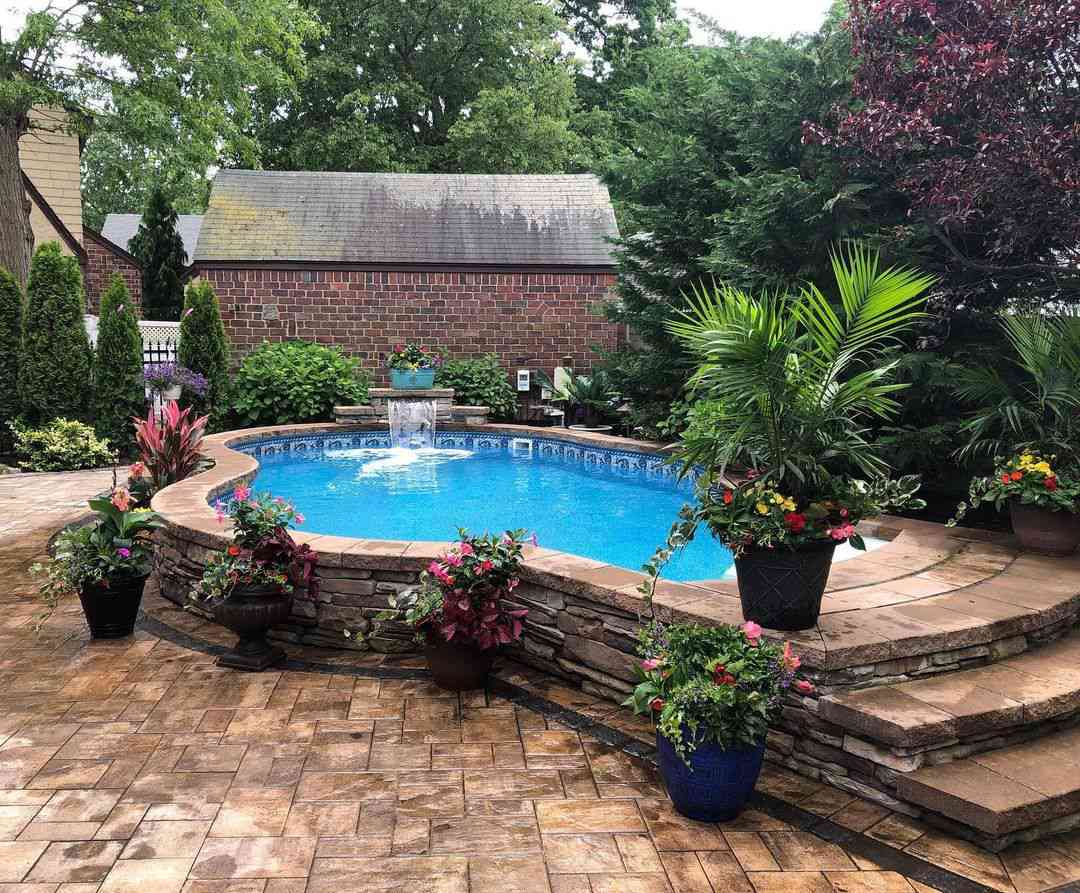If you’re considering getting an above ground pool, it’s essential to be aware of any potential drawbacks. While these pools offer many advantages, such as being more affordable and easier to install than in-ground pools, they do come with a few disadvantages worth considering. From limited customization options to shorter lifespans compared to their in-ground counterparts, it’s important to weigh the pros and cons before making your decision. So, let’s explore the downsides of above ground pools in more detail and help you make an informed choice for your summer oasis.
This image is property of pixabay.com.
1. Cost
1.1 Initial Cost
When it comes to the initial cost, above ground pools tend to be a more affordable option compared to in-ground pools. However, it’s important to consider the fact that the initial cost of an above ground pool includes not just the pool itself, but also additional expenses such as installation, accessories, and any landscaping or deck construction that may be needed. While still less expensive than in-ground pools, the initial cost of above ground pools can still be a significant investment.
1.2 Limited Lifespan
Another disadvantage of above ground pools is their limited lifespan. These pools are typically constructed with materials like steel, resin, or aluminum, which can degrade over time due to exposure to the elements. While proper maintenance and care can prolong the lifespan of an above ground pool, it is generally expected that these pools will need to be replaced after a certain number of years. Considering this, it’s important to factor in the potential replacement cost when considering the overall cost of an above ground pool.
1.3 Maintenance Costs
Maintenance costs can also be a drawback of above ground pools. Keeping the water clean and properly balanced requires regular chemical treatments and filtration system maintenance. Additionally, above ground pools may require periodic repairs or maintenance work such as patching up leaks or replacing damaged parts. These ongoing costs for maintenance can add up over time and should be taken into account when considering the affordability of an above ground pool.
2. Durability
2.1 Vulnerable to Damage
Above ground pools are generally more vulnerable to damage compared to in-ground pools. Since they are not built into the ground, they are exposed to various factors that can potentially cause damage, such as extreme weather conditions, falling branches, or accidental impacts. The materials used in above ground pools, while designed to withstand such factors to some extent, may not be as durable as the materials used in in-ground pools. Therefore, it is important to take precautions to protect the pool and ensure its longevity.
2.2 Prone to Leaks
Leakage is another common issue with above ground pools. The seams and connections of these pools can be prone to leaks over time, especially if the pool is not properly maintained or if the materials used are of lower quality. Dealing with leaks can be a time-consuming and costly process, as it may involve locating and repairing the source of the leak, draining and refilling the pool, and potentially replacing damaged components. The possibility of leaks should be considered when deciding on an above ground pool.
3. Limited Design Options
3.1 Size and Shape Constraints
One of the disadvantages of above ground pools is the limited design options when it comes to size and shape. Unlike in-ground pools, which can be customized to fit specific dimensions and contours, above ground pools are typically available in standard sizes and shapes. This lack of flexibility can be disappointing for those looking for a pool that perfectly matches their vision or the layout of their backyard. It’s important to carefully consider the available design options and choose one that best fits your needs and preferences.
3.2 Difficult to Customize
In addition to size and shape constraints, above ground pools also offer limited opportunities for customization. Unlike in-ground pools, which can be enhanced with various features such as waterfalls, diving boards, or intricate tiling, above ground pools often have fewer options for customization. While it is possible to add accessories and features to enhance the pool, the choices may be more limited and may require specific modifications to the pool structure. This can be a drawback for those seeking a more personalized and unique pool experience.
4. Safety Concerns
4.1 Accessibility for Children
Above ground pools present certain safety concerns, especially when it comes to accessibility for children. While most above ground pools have ladders or steps to enter and exit the pool, these access points can be a potential hazard for unsupervised children. Without proper safety measures such as pool alarms, pool covers, or fences, there is an increased risk of accidents or drownings. It is crucial to prioritize safety precautions and take appropriate measures to secure the pool area when owning an above ground pool.
4.2 Higher Risk of Accidents
Compared to in-ground pools, above ground pools generally have a higher risk of accidents. The height of the pool wall can pose a greater danger, especially if someone accidentally falls or jumps from the pool’s edge. Additionally, the structure of above ground pools may not be able to withstand excessive weight or pressure, increasing the risk of accidents if someone were to lean or sit on the pool wall. Understanding and adhering to the weight and capacity limitations of an above ground pool is essential to ensure the safety of everyone using it.
This image is property of pixabay.com.
5. Aesthetics
5.1 Less Visually Appealing
When it comes to aesthetics, above ground pools may be considered less visually appealing compared to their in-ground counterparts. The elevated nature of above ground pools can stand out in a backyard and may not blend as seamlessly with the surrounding landscape as an in-ground pool would. Additionally, above ground pools often require the installation of a deck or other surrounding structures, which can further impact the overall visual appeal. It is important to carefully consider the aesthetic impact an above ground pool may have on your property before making a decision.
5.2 Decreased Property Value
In some cases, the presence of an above ground pool can actually decrease the value of a property. While pools in general can be seen as desirable features, above ground pools are often seen as less desirable compared to in-ground pools. Potential buyers may perceive an above ground pool as temporary or less luxurious, which can affect their perception of the overall value of the property. It’s important to consider the potential impact on property value if you were to sell your home in the future.
6. Temperature Regulation
6.1 Cold Water
One of the drawbacks of above ground pools is that the water temperature can be significantly colder compared to in-ground pools. Since above ground pools are not heated by the natural ground, the water can cool down more quickly, especially in colder climates or during colder seasons. This can make swimming or spending time in the pool less enjoyable, particularly for those who prefer warmer water temperatures.
6.2 Limited Heating Options
Another disadvantage of above ground pools is the limited options for heating. Unlike in-ground pools, which often have built-in or customizable heating systems, above ground pools typically rely on external heating methods such as solar covers, pool heaters, or heat pumps. While these options can help raise the water temperature to a more comfortable level, they can be less efficient and may require additional costs and maintenance. The limitation in heating options should be taken into consideration, particularly for those who prioritize warmer water temperatures.
This image is property of pixabay.com.
7. Installation Restrictions
7.1 Limited Placement Options
Above ground pools often come with restrictions when it comes to placement. Due to their structure and design, these pools need to be installed on level ground, which can limit the available placement options in a backyard. Factors such as space, slope, overhead obstructions, and even local regulations may impact where an above ground pool can be installed. It is important to carefully assess your property and ensure that it meets the necessary requirements for installing an above ground pool before moving forward with the purchase.
7.2 Ground Preparation
Another factor that can add to the overall cost and effort of owning an above ground pool is the ground preparation required for installation. Leveling the ground, removing vegetation or rocks, and laying a suitable base for the pool can be time-consuming and labor-intensive. It may also require additional expenses, such as hiring professional services or renting equipment. Proper ground preparation is crucial to ensure the stability and longevity of the pool, and it should be taken into consideration when planning to install an above ground pool.
8. Difficulty in Upgrading
8.1 Expensive to Upgrade
Upgrading an above ground pool can be more challenging and potentially more expensive compared to in-ground pools. Since above ground pools are not as customizable or built to accommodate major modifications, making significant upgrades or changes to the pool structure can be more difficult and costly. Adding features such as a deeper pool, different shape, or intricate design may require extensive modifications or even the replacement of the entire pool. Considering the limitations of above ground pools, it’s important to carefully consider your long-term needs and preferences before making a final decision.
8.2 Limited Features
In addition to the cost aspect, above ground pools also offer limited options in terms of features and accessories. While it is possible to enhance the pool with certain accessories, the choices may be limited compared to the wide range of features available for in-ground pools. The size, shape, and structure of above ground pools may restrict the installation of certain features or accessories, such as diving boards, waterfalls, or integrated lighting systems. If having a variety of features is important to you, an above ground pool may not provide the extensive options available with in-ground pools.
9. Lifespan
9.1 Prone to Wear and Tear
The lifespan of an above ground pool can be affected by wear and tear over time. The constant exposure to the elements, as well as the regular use and maintenance, can contribute to the degradation of the pool materials. Over time, the pool walls, liners, and other components may weaken or deteriorate, leading to potential issues such as leaks or structural instability. While proper care and maintenance can extend the lifespan of an above ground pool, it is important to keep in mind that these pools may have a limited lifespan compared to in-ground pools.
9.2 Replacement Costs
As mentioned earlier, the limited lifespan of above ground pools means that they may need to be replaced after a certain number of years. This replacement cost should be considered when evaluating the overall affordability of an above ground pool. The cost of purchasing a new pool, along with any necessary installation or upgrades, can be a significant expense. It is important to factor in the potential replacement costs when budgeting for an above ground pool and to plan accordingly for future replacements.
10. Resale Value
10.1 Decreased Appeal to Buyers
The presence of an above ground pool can potentially decrease the appeal of a property to potential buyers. While pools in general can be seen as desirable features, above ground pools may be perceived as less attractive or less luxurious compared to in-ground pools. This can limit the pool’s ability to increase the overall value of a property or attract a wider range of potential buyers. It is important to consider the potential impact on resale value when deciding whether to invest in an above ground pool.
10.2 Difficulty in Removal
In the event that you decide to remove an above ground pool, there can be difficulties and expenses associated with the removal process. Unlike in-ground pools, which can be filled in and restored to their original state, above ground pools often require dismantling and removal. This process can involve the disposal of large, heavy components and potentially damage to the surrounding landscape. The potential challenges and costs of removing an above ground pool should be taken into consideration, particularly for those who may not plan to keep the pool permanently.








